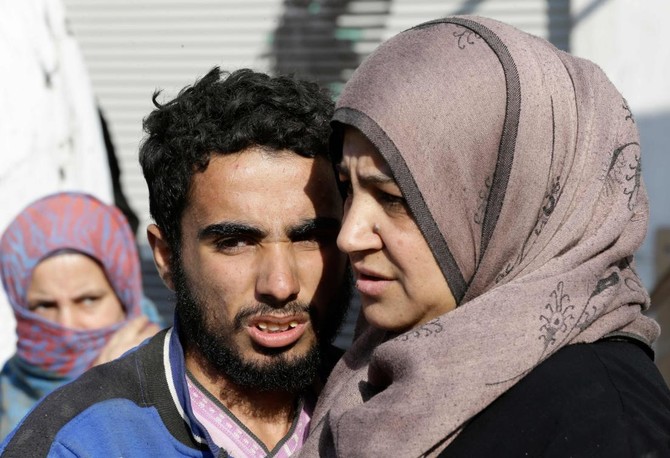ANKARA/AMMAN: Syrian regime troops backed by Russian air power stepped up their attacks on Sunday in areas of Deir Ezzor still held by Daesh.
Russian jets carried out heavy airstrikes on eastern Syria’s largest city as troops pushed toward the Hay Al-Umal area, which overlooks some of the remaining Daesh-held neighborhoods where an estimated 1,500 civilians are trapped.
The Syrian regime has gradually tightened the noose around Daesh after the army opened a land route into Deir Ezzor in September with the help of Russian airstrikes and Iran-backed militias, breaking a siege that had lasted nearly three years.
Tens of thousands of civilians have fled the fighting in the province, the last stronghold of Daesh. “The situation is catastrophic, there are families under the rubble and others who fled have no shelter,” Sheikh Awad Al-Hajjr, a tribal leader, told Reuters.
Meanwhile, a seventh round of peace talks begins on Monday in Astana, where Russia and Turkey will continue their coordination on Syria. The northwestern province of Idlib is expected to dominate the agenda at the two-day meeting.
“The Turkish Army is working very closely with Russia to secure and monitor the de-escalation zone in Idlib,” Emre Ersen, a Syria analyst at Marmara University in Istanbul, told Arab News.
“Russia expects Turkey to play an influential role there in keeping rebel groups away from the Al-Qaeda-affiliated Hayat Tahrir Al-Sham.”
Turkish and Russian interests converge on the need to develop an efficient dialogue mechanism regarding current and potential developments in their neighborhood, said Mehmet Seyfettin Erol, head of ANKASAM, a think tank in Ankara.
“The Astana peace process confirmed that both parties will cooperate to end the conflicts in Syria and Iraq, and to preserve their territorial integrity,” Erol told Arab News.
Also on Sunday, Damascus said it still considered Raqqa an occupied city, less than two weeks after Syrian Democratic Forces (SDF) drove Daesh out of its one-time Syrian capital.
“Raqqa is still an occupied city and cannot be considered liberated until the entry of the Syrian army, which is fighting IS (Daesh) along with its allies,” the Foreign Ministry said in a statement.
Detailed coverage — Page 4
Airstrikes and troops pound last Daesh bastion in Deir Ezzor
Airstrikes and troops pound last Daesh bastion in Deir Ezzor

Jordan condemns Israel’s seizure of planning powers at Ibrahimi Mosque

- Announcement on Wednesday by Israeli Civil Administration said it had transferred planning powers from Palestinian Authority-run Hebron Municipality to its own Supreme Planning Council
AMMAN: Jordan’s Ministry of Foreign and Expatriates Affairs on Friday strongly condemned Israel’s decision to revoke the planning and construction authorities of the Hebron Municipality at the Ibrahimi Mosque, the Jordan News Agency reported.
The ministry described the move as a blatant violation of international law and the historical and legal status quo at the holy site, JNA added.
The condemnation follows an announcement on Wednesday by the Israeli Civil Administration the body overseeing the occupied West Bank, that it had transferred planning powers from the Palestinian Authority-run Hebron Municipality to its own Supreme Planning Council.
The decision was accompanied by approval for a project to construct a roof over the mosque’s internal courtyard, a move that has drawn fierce Palestinian opposition.
The Hebron Municipality also condemned the Israeli decision, describing it as a “serious and illegal violation” and part of a systematic effort to alter the status quo at the mosque and weaken the authority of Palestinian institutions responsible for its management.
In a statement, the Jordanian ministry said Israel, as the occupying power, was acting unlawfully by unilaterally approving construction works at the Ibrahimi Mosque and stripping Palestinian authorities of their administrative powers, warning that the measures undermine the Islamic administration of the site.
The ministry’s official spokesperson, Fouad Al-Majali, affirmed Jordan’s “absolute rejection and severe condemnation” of Israel’s continued illegal unilateral measures in the occupied West Bank, most recently those targeting the Ibrahimi Mosque in Hebron.
Al-Majali added that the actions constituted clear violations of international law and international humanitarian law, including the 1954 Hague Convention for the Protection of Cultural Property in the Event of Armed Conflict, as well as relevant United Nations resolutions.
He also pointed to UNESCO’s 2017 decision to inscribe Hebron’s Old City and the Ibrahimi Mosque on the List of World Heritage in Danger.
He called on the international community to shoulder its “legal and moral responsibilities” by compelling Israel to halt its illegal measures in the occupied Palestinian territory, protect the cultural and religious heritage of the Ibrahimi Mosque, and preserve its outstanding universal value, which he said is under increasing threat due to Israeli actions.
Al-Majali further emphasized that achieving security and a just and comprehensive peace would remain impossible without fulfilling the legitimate rights of the Palestinian people to self-determination, including the establishment of an independent, sovereign Palestinian state on 1967 lines, with East Jerusalem as its capital.










